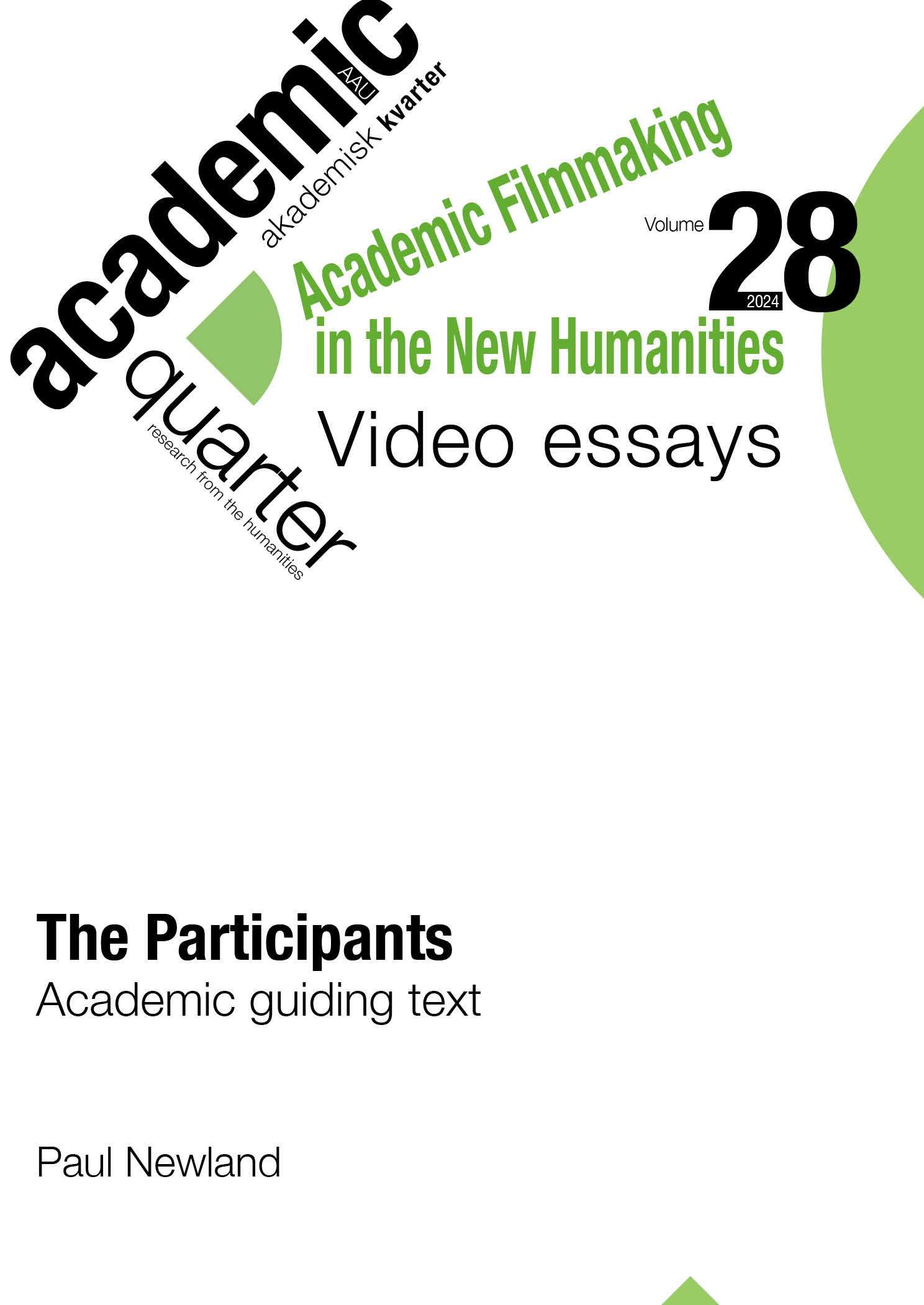Abstract | Abstract
While universities increasingly offer institutional support for academic filmmaking, in the specific case of ethics this support can sometimes become an impediment to creativity. The requirement to follow comprehensive university ethical procedures - which are usually developed with great care and attention to the needs of researchers but with little or no focus on creative practice research - might stymie the artistic practice of filmmakers. My video The Participants: a reflection on the ethics of smartphone filmmaking as research aims to offer a provocation intended to challenge university practitioner-researchers to consider the ethics of their practice, but also, at the same time, a provocation to university ethics protocols and procedures. Specifically, the films seeks to encourage the viewer to reflect on the ways in which filmmaker researchers working in in public places might better consider the ethical issues raised by their practice, especially when subsequently employing (and manipulating) footage of individuals who have not given their consent to be filmed. For The Participants I used an iPhone 11 to capture video images of tourists videoing with their smartphones at Grand Central Station, New York.
Referencer
Aufderheide, Patricia, Peter Jaszi, and Mridu Chandra. 2009. Honest Truths: Documentary Filmmakers on Ethical Challenges in Their Work. Report. Center for Social Media, American University. https://cmsimpact.org/resource/honest-truths-documentary-filmmakers-on-ethical-challenges-in-their-work/
Becker, Howard S. 1988. “Foreword: Images, Ethics, and Organizations.” In Image Ethics: The Moral Rights of Subjects in Photographs, Film and Television, edited by Larry P. Gross, John Stuart Katz, and Jay Ruby, xi-xvii. Oxford University Press.
Butchart, Garnet C. 2006. “On Ethics and Documentary: A Real and Actual Truth.” Communication Theory 16(4): 427–452. https://doi.org/10.1111/j.1468-2885.2006.00279.x
Castells, Manuel, Mireira Fernández-Ardèvol, Jack Linchuan Qiu, and Araba Sey. 2007. Mobile Communication and Society. A Global Perspective. MIT Press. https://doi.org/10.7551/mitpress/4692.001.0001
Gough-Brady, Catherine. 2022. “Questioning Creative Practice Human Research Ethics.” The International Journal of Creative Media Research 9 (Oct 2022). https://doi.org/10.33008/IJCMR.2022.07
Green, Nicola. 2002. “On the move: Technology, mobility, and the mediation of social time and space.” The Information Society, 18(4): 281–292. https://doi.org/10.1080/01972240290075129
Gross, Larry P., John Stuart Katz, and Jay Ruby, eds. 1988. “Introduction: A Moral Pause”, In Image Ethics: The Moral Rights of Subjects in Photographs, Film and Television, edited by Larry P. Gross, John Stuart Katz, and Jay Ruby, 3-33. Oxford University Press. https://doi.org/10.1093/oso/9780195067804.003.0001
Katz, James, and Mark Aakhus, eds. 2002. Perpetual Contact: Mobile Communication, Private Talk, Public Performance. Cambridge University Press. https://doi.org/10.1017/CBO9780511489471
Katz, John Stuart, and Judith Milstein Katz. 1988. “Ethics and the Perception of Ethics in Autobiographical Film.”, In Image Ethics: The Moral Rights of Subjects in Photographs, Film and Television, edited by Larry P. Gross, John Stuart Katz, and Jay Ruby, 119-134. Oxford University Press. https://doi.org/10.1093/oso/9780195067804.003.0006
Nichols, Bill. 1991. Representing Reality: Issues and Concepts in Documentary. Bloomington: Indiana University Press. https://doi.org/10.2307/j.ctv32bm1p2
Nichols, Bill. 2016. Speaking Truths with Film: Evidence, Ethics, Politics in Documentary. University of California Press. https://doi.org/10.1525/9780520964587
Piotrowska, Agnieszka. 2013. Psychoanalysis and Ethics in Documentary Film. Routledge. https://doi.org/10.4324/9781315887357
Pryluck, Calvin. 1976. Sources of Meaning in Motion Pictures and Television. New York: Arno Press.
Renov, Michael. 2004. The Subject of Documentary. Minneapolis and London: University of Minnesota Press.
Rosenthal, Alan, ed. 1988. New Challenges for Documentary. Berkeley: University of California Press.
Rosenthal, Alan, and John Corner, eds. 2005. New Challenges for Documentary. Manchester and New York: Manchester University Press, Second Edition.
Rouch, Jean. 2003. Ciné-Ethnography. Minneapolis and London: University of Minnesota Press.
Timan, Tjerk, and Anders Albrechtslund. 2018. “Surveillance, Self and Smartphones: Tracking Practices in the Nightlife.” Sci Eng Ethics 24:853–870. https://doi.org/10.1007/s11948-015-9691-8
Winston, Brian. 1995. Claiming the Real: The Documentary Film Revisited. British Film Institute.
Winston, Brian. 2000. Lies, Damn Lies and Documentaries. British Film Institute.

Dette værk er under følgende licens Creative Commons Navngivelse – Ikke-kommerciel – Ingen Bearbejdede Værker (by-nc-nd).
Copyright (c) 2024 Paul Newland
